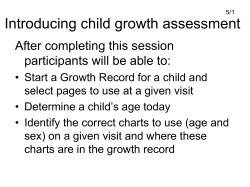
Infant young child feeding practice and their nutritional status in a
Infant young child feeding practice and their nutritional status in a national nutrition program area S Sharmin , Hoque M Asirul and F Saleh Department of Community Nutrition, BIHS EMINENCE , Hena Nibash,3/6 Asad Avenue, Mohammadpur,Dhaka-1207 Correspondence: sharmin@eminence-bd.org, sharmin.sk@gmail.com Background Infant and young child feeding (IYCF) practices include breastfeeding and complementary feeding. In Bangladesh 43% of children are breastfed within one hour of birth. (BDHS 2007) Only 43% of infants (<6 months) are exclusively breastfed, the remainders are given water, other milk, and other liquids in addition to breast milk. (BDHS 2007) Exclusive Breastfeeding rate has increased to 64% (BDHS 2011) Continuation of breastfeeding is 98% (BDHS, 2007) 2 Background Complementary feeding among children age 6–9 months is 74 % . (BDHS 2007) Complementary foods given to infants and young children in Bangladesh are often nutritionally inadequate and unsafe, leading to malnutrition. (BBF, 2004; BDHS, 2004; BBS/UNICEF, 2003) 41% of children under 5 years are underweight, 43% stunted and 17% wasted (BDHS, 2007) Nutritional status has imporved,36% underweight,41% stunted and 16% wasted(BDHS 2011) . 3 Objective General objective: To assess infant young child feeding practice and their nutritional status in a national nutrition program area. 4 Specific objectives To assess the proportion of the mothers/caregivers followed IYCF practice according to WHO guidelines in the NNP area. To assess the IYCN status of under 2 children in the NNP area. To assess the association between socio-demographic characteristics and IYCF. To assess the association between socio-demographic characteristics and IYCN. To assess the association between IYCF and IYCN. 5 Method A cross-sectional study was conducted in Kapasia under Gazipur district, Bangladesh. In total, 150 children of 0-2 years were selected purposively. 6 Results Breast feeding status 98 100 90 80 70 60 50 40 30 20 10 0 82.7 67.3 Initiation of Exclusive BF Continuation BF of BF Initiation of BF Results were expressed as (%) Exclusive BF Continuation of BF 7 Starting time of Complementary feeding 100 90 80 70 60 50 40 30 20 10 0 83.1 16.9 Early starting Tim ely starting Early starting Tim ely starting Results were expressed as (%) 8 Strategy to attract children to feed 11.0 24.0 3.0 Feeding slowly Talking during feeding 17.0 Forcing child to eat Helping child to eat 45.0 Others Results were expressed as (%) 9 Steps taken by the caregivers for maintaining hygiene before feeding Steps taken by the caregivers for maintain hygiene % Hand and utensil washing practices Wash hands properly Wash utensils properly Wash hands & utensils properly Nothing 76.0 5.6 11.3 7.0 Results were expressed as (%) 10 Steps taken by the caregivers for maintaining hygiene before feeding Hand washing after toilet use Soap 91.5 Ash 3.0 Nothing 4.0 Other 1.5 Type of utensils used Bottles 34 Cups 26.6 Other 39.4 Results were expressed as (%) 11 Education of mother and EBF Education of mother Pearson 2 EBF P value (df=2 ) Yes No Illiterate 80.0 % 20.0 % Primary 94.0 % 6.0 % Higher 73.0 % 27.0 % 11.247 .004 Results were expressed as (%), 2 test was performed and P<0.05 was level of significance 12 Nutritional status 100 90 80 70 60 50 40 30 20 10 0 22 78 WAZ Normal 11.6 31.7 88.4 68.3 HAZ Underweight WHZ Stunting Wasting Results were expressed as (%) 13 Sex and nutritional status (HAZ) of children Sex of children Nutritional status Pearson 2 P value (df=2 ) Normal Moderate stunting Severe stunting Male 42.3 % 46.1 % 11.6 % Female 88.2 % 11.8 % 0% 15.005 .001 Results were expressed as number (%), 2 test was performed and P<0.05 was level of significance 14 Conclusion In the study area infant young child feeding practices were good and their nutritional status was acceptable and the prevalence of malnutrition was low. Comprehensive policy response is required to address infant young child nutrition in Bangladesh. 15 THANK YOU 16
© Copyright 2025


















